SMART local union officers continued their work on day two of the 2025 SMART Leadership Conference — digging into remarks from high-profile guest speakers and building skills alongside fellow members in breakout sessions.
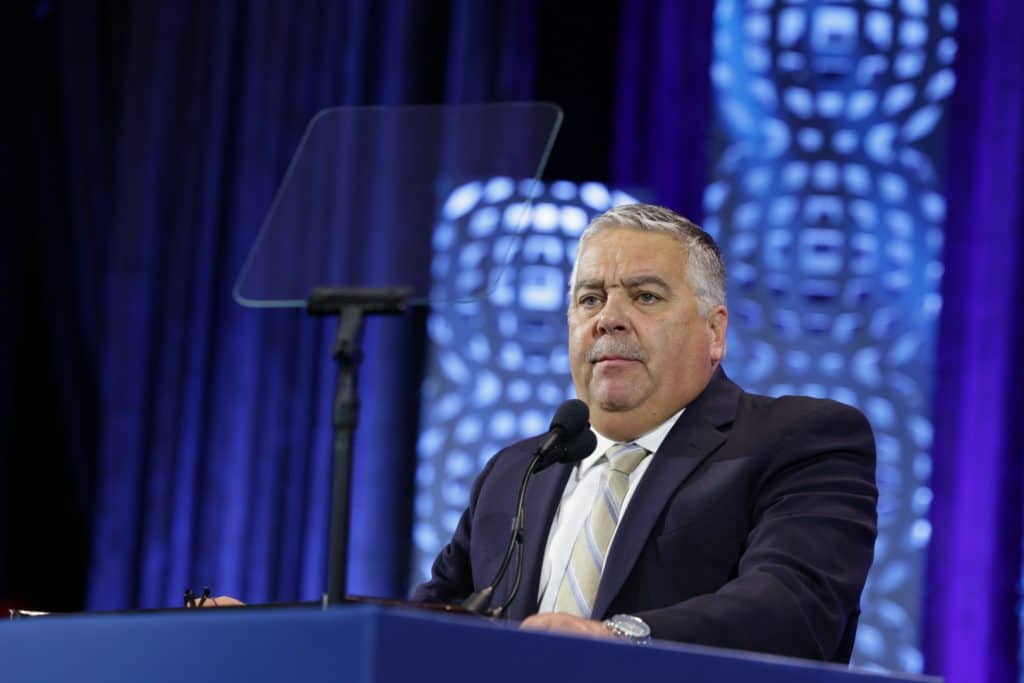
Before getting into speakers and conference reports, SMART General President Michael Coleman introduced the 2025 Leadership Conference Charity, HEART 9/11. Originally consisting of a team of first responders who came together in the wake of September 11, 2001 — fire fighters, New York City building trades workers and others — HEART 9/11 has evolved into an organization that responds to disasters, providing relief to communities and families across North America and internationally.
“They started out honoring the sacrifices of all who were lost that day,” said General President Coleman. “Now, their mission is to respond to natural and man-made disasters, providing relief to communities and families all over.”
General sessions welcome congressional allies
Union sheet metal and transportation workers are greatly impacted by the actions of the federal government — both positively, like the Federal Railroad Administration’s two-person crew rule, and negatively, like the recent One Big Beautiful Bill Act, which is set to raise health care costs and cancel projects that would have put SMART members on construction jobs.
That’s why SMART works tirelessly to develop strong alliances with pro-worker legislators across the political spectrum, advance policy at the state and federal level, and more. On Tuesday, SMART-TD National Safety & Legislative Director Jared Cassity and Governmental Affairs Director Steve Dodd kickstarted the conference’s joint session with a report on our union’s political advocacy.
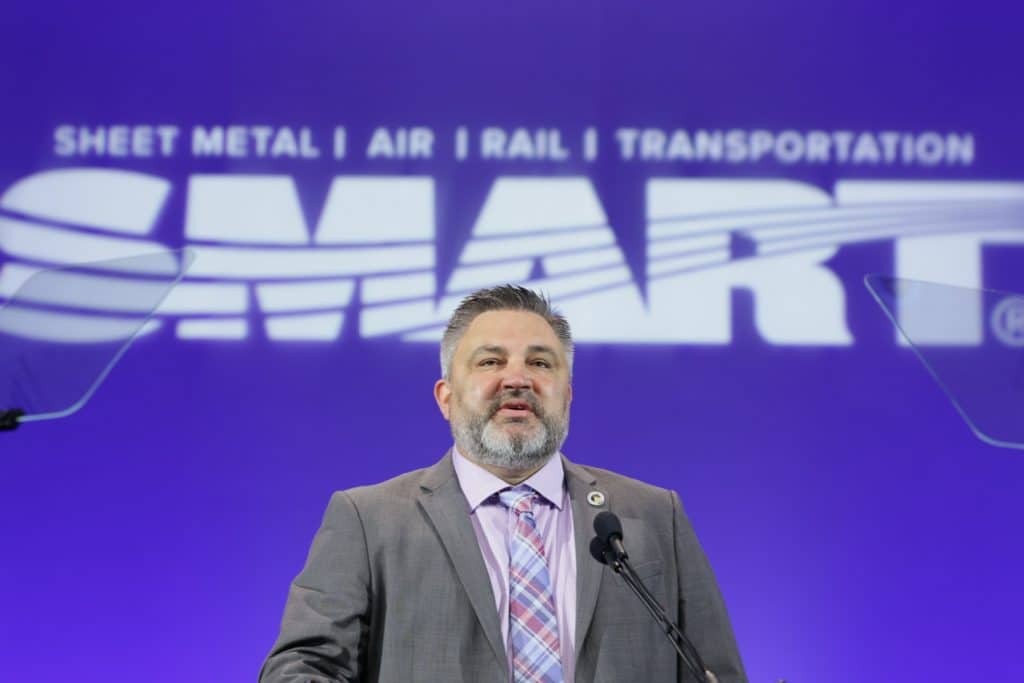
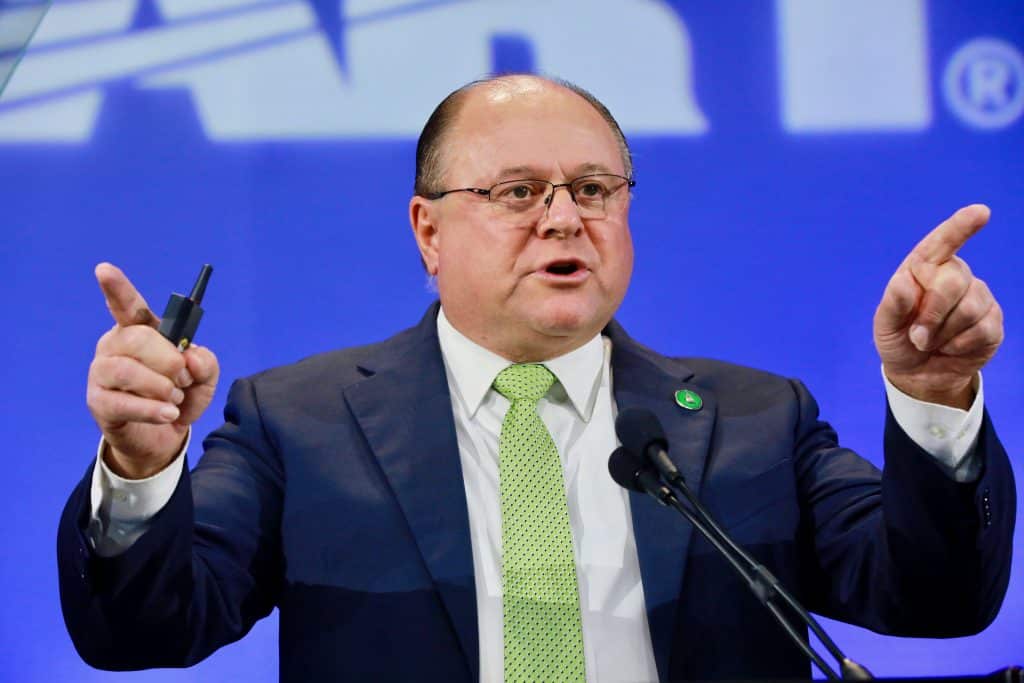
At the end of 2024, Dodd said, we had billions of dollars invested in infrastructure projects, more than 600 construction projects with project labor agreements in place or being negotiated, investment in registered apprenticeships and updated Davis-Bacon prevailing wage rules. Since January 2025, we have seen a freezing of funding for infrastructure projects, a repealing of an executive order requiring labor standards on federally funded infrastructure projects, the cancellation of billions of dollars in energy projects that would have put SMART members to work, and the passage of a spending bill that will cut jobs and drive up costs for union workers across the country.
“Despite federal changes,” Dodd noted, “we have had some significant wins at the state level,” referencing offsite fabrication legislation, indoor air quality bills and other job-creating laws local unions passed in states like Virginia, Colorado, Rhode Island, Connecticut, New Mexico and Oregon.
Cassity detailed the charge and the work his department pursues, which is focused on both legislative advocacy and on transportation safety. Describing the tragic consequences of the East Palestine disaster, and how that derailment and explosion represent the fight SMART-TD faces every day to protect members, TD’s new national safety and legislative director explained that it is people — SMART-TD members — not technology that truly make a difference.
“It’s not about safety for the railroads. It’s about profit — every single time,” he said, noting that any and all technology that is introduced in the railroad industry needs to support, not replace, union railroaders.
Cassity detailed the many safety initiatives SMART-TD is pushing for, such as the Confidential Close Call Reporting System, yardmaster hours of service, curbing train lengths and protecting bus and transit operators. Looking forward, he said, the National Safety & Legislative Department will continue to build bipartisan support for operator assault prevention, the Rail Safety Enhancement Act, funding the Railroad Retirement Board and beyond.
Despite recent setbacks, the work of Cassity, Dodd and SMART members across North America made itself evident in remarks from Congressman Tom Suozzi, House Democratic Leader Hakeem Jeffries, Congresswoman and New Jersey gubernatorial candidate Mikie Sherrill and Congressman Joe Morelle, political leaders who have stood by SMART members throughout their public service careers.
Congressman Suozzi, who represents Long Island and parts of Queens, addressed the conference on Monday morning. Suozzi has defined his time in Congress by pushing for prevailing wages, strong apprenticeship programs, union jobs and two-person crews, and he proactively stands alongside SMART-TD members at the Long Island Rail Road, advocating for their priorities in Congress. He emphasized that he wants divisive politics swapped out in favor of “back to the basics,” which means that across party lines, politicians should be advocating forfair wages, strong unions and rebuilding the middle class.
Suozzi told attendees that he will remain an ally and has promised to fight for the elimination of taxes on overtime, support pro-worker legislation like two-person crews and will promote collaboration between parties to improve SMART members’ lives.
“We need to return back to rewarding hard work,” he said. “When you play by the rules, you should earn a decent life.”
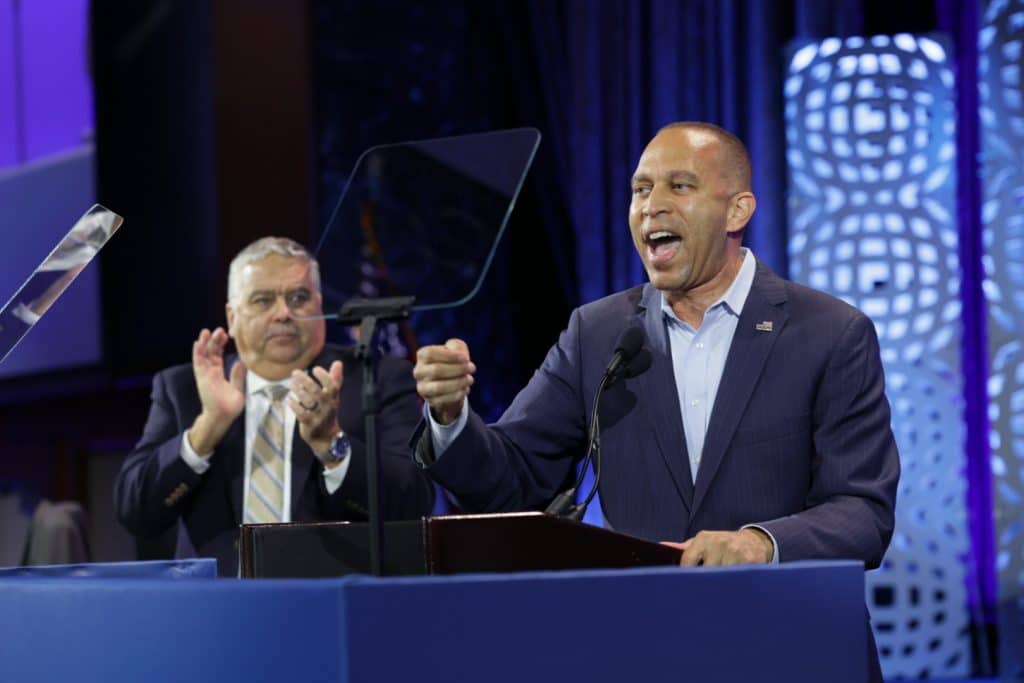
Rep. Jeffries, who has worked to support and pass laws that benefit sheet metal and transportation workers for years, fired up officers with a speech about our core American values and the fight ahead:
“What an honor and privilege to be with this great union during this critical time — a union that continues to fight for hardworking American taxpayers, for your members, for people who are working hard to pursue the American dream.”
Jeffries outlined the pro-worker legislation he was proud to help pass from 2021-2024: the Bipartisan Infrastructure Law, the CHIPS Act and the Inflation Reduction Act, all of which created jobs and, as he said, “put the American worker first.”
“When you put workers first,” he added, “when you put unions first, you put America first.”
When you work hard and play by the rules, you should be able to provide for yourself and your families. Costs are too high, Jeffries said, and the actions of Congress and the current presidential administration aren’t doing anything to stop that, particularly with the passage of the 2025 spending bill. That bill, Jeffries noted, is an attack on healthcare, on organized labor, on good-paying jobs. He promised that in response, he and fellow House Democrats would put their focus on making the lives of working families and union members better: “We don’t need to be in a country of the billionaires, by the billionaires and for the billionaires. We should be a country of organized labor, by organized labor, for organized labor.”
The fight ahead, Jeffries said, is not going to be easy. The road will be challenging. But unions and worker allies aren’t going to back down. He vowed to work hard to elect a pro-union Congress that will fight on behalf of SMART members, the right to organize, prevailing wages and beyond.
“Together, we will succeed,” Jeffries declared.
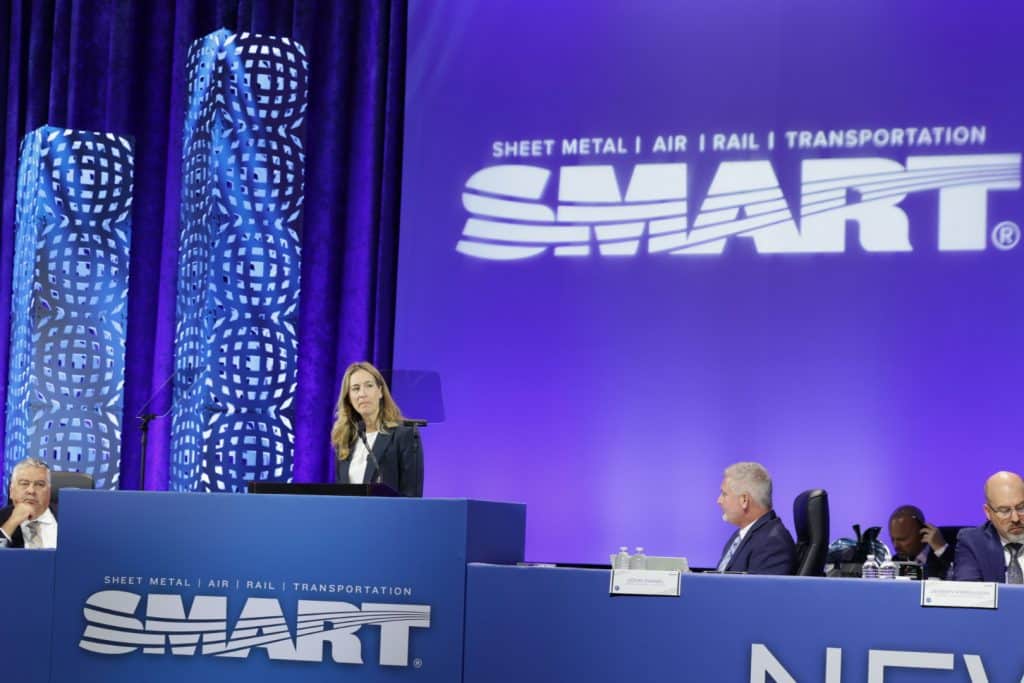
During her time in Congress, Rep. Sherrill has done more than just talk about being a pro-worker candidate. With her votes to pass job-creating laws for sheet metal workers and her advocacy for railroad safety and union jobs in the transportation industry, she has walked the walk. Sherrill took time off the campaign trail for New Jersey governor to speak to officers about her dedication to ensuring organized labor and SMART members are prioritized, whether in Congress or, if elected, as Jersey governor.
“I know that people come before you all the time, and I know that you hear all the time about people’s labor connections,” Sherrill said. “It’s important that we acknowledge that. It’s important that we understand just how many families across this great country have been impacted by labor unions.”
She talked about her support for prevailing wages, project labor agreements, infrastructure funding and beyond, as well as her votes for the PRO Act and the National Apprenticeship Act. She vowed to carry that same dedication to the New Jersey statehouse.
“We’re facing big challenges in the Garden State,” Sherrill said.
Discussing her campaign to build housing and infrastructure in New Jersey — with strong labor standards to put SMART members to work — and lower costs for working families across the state, she described the importance of investing in public transit and transportation in the state, ensuring that railroad crews and transit operators are safe and protected. (Sherrill has worked closely with New Jersey State Legislative Director Ron Sabol in the past.) She also detailed her plans to expand apprenticeship programs and invest in childcare and mental health programs for members and families.
“While some paint this election as a Democrat versus Republican narrative, that’s not what this is about,” Sherill concluded. “This election is about making our state the best possible state for working families.”
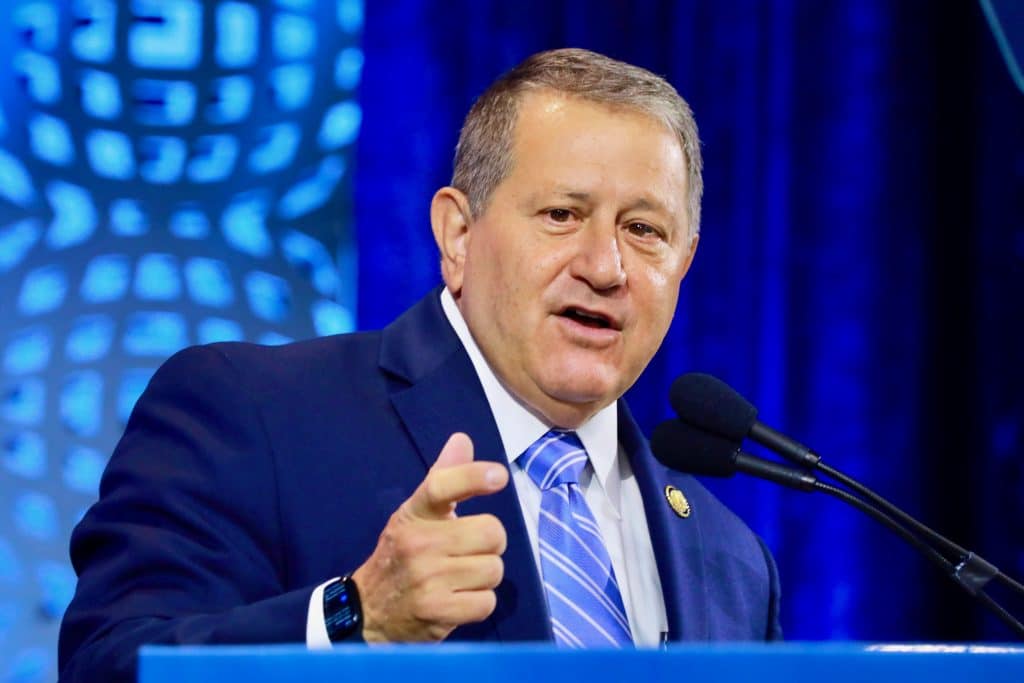
Rep. Morelle has represented Rochester, New York, in Congress since 2018, standing up for Local 46 sheet metal workers and all SMART members nationwide. His voting record reflects his actions on behalf of SMART workers and families — voting for job-creating laws like the Bipartisan Infrastructure Law, the CHIPS Act, the Rail Workers Sick Leave Act and more. During his remarks to conference attendees, he thanked International and local leaders and SMART members everywhere for the work they do every day to better our country. He also outlined the ways he and fellow pro-worker legislators are fighting alongside SMART on behalf of members — not with words, but with actions.
Informed by his father’s life as a union plumber, Morelle discussed the importance of doing the work, whether on the jobsite, in the railyard or in the halls of government.
“That’s what American exceptionalism is — it’s not about being richer, about being more sophisticated, it’s about outworking everybody … and that’s what SMART members do,” he said.
Morelle also talked about how the recently passed spending bill takes money from the poorest people in America in order to benefit the richest. As billionaires get richer and working people suffer, he called for investment in union labor, PLAs on every project in America, the passage of the PRO Act and the National Apprenticeship Act, and more.
“If we want to fix the problems, we need to spend less time talking, more time doing. … Let’s not waste time,” he concluded.
Earlier in the morning, conferencegoers also heard from Helmets to Hardhats Executive Director Martin Helms. Helms leads Helmets to Hardhats’ efforts to help veterans transition to good, fulfilling careers in the building trades — a noble mission that benefits veterans, communities and local unions alike. SMART has partnered with Helmets to Hardhats for years to help provide those who served with good, fulfilling careers in the sheet metal industry. Helms explained how local unions can partner with H2H and help veterans use the GI Bill to join the unionized sheet metal industry, urging officers to continue outreach to those who served our country.
“The ultimate success of the program is a joint effort between H2H and the local union and JATC,” Helms said. “I cannot thank you enough for your participation in the H2H program — we’re doing great things.”
Department directors detail SMART’s work to strengthen our union
In both the joint session and individual industry sessions, SMART International directors gave departmental presentations that outlined, broadly, some of SMART’s efforts to secure the future for members across North America.
SMART Railroad, Mechanical and Engineering Department Director Peter Kennedy, who represents a variety of sheet metal workers in the railroad industry, reported on the many attacks that SMART RME workers face, including the threat of Amtrak privatization, pulled high-speed rail funding, cuts to transit funding and beyond.
“Our members did not go and pick these fights, but I can tell you one thing, we’re going to finish them,” Kennedy said.
“We’re doing some good work – we’re winning, and we’re creating some good opportunities for our members,” he added, detailing recent contract wins in Boston and San Diego, as well as organizing victories in Florida and Vermont.
Through efforts like the Belonging and Excellence for All initiative, the SMART-SMACNA maternity leave benefit, the childcare benefit program with TOOTRiS and beyond, the SMART Department of Special Projects aims to better the lives of SMART members, improve recruitment and retention, and grow our union’s collective strength. Department Director Louise Medina outlined those initiatives and others, including the SMART Women’s Committee, RISE Committee and Disaster Relief Fund, in her presentation to officers, encouraging locals to take advantage of programs designed to benefit members.
“SMART is committed to building a stronger future for every member, in every union hall and on every jobsite,” she said. “We are not just delivering programs, we are building power, connection, and belonging across our union. This is how SMART continues to lead the industry, and this is how SMART keeps fighting for what matters, our members.”
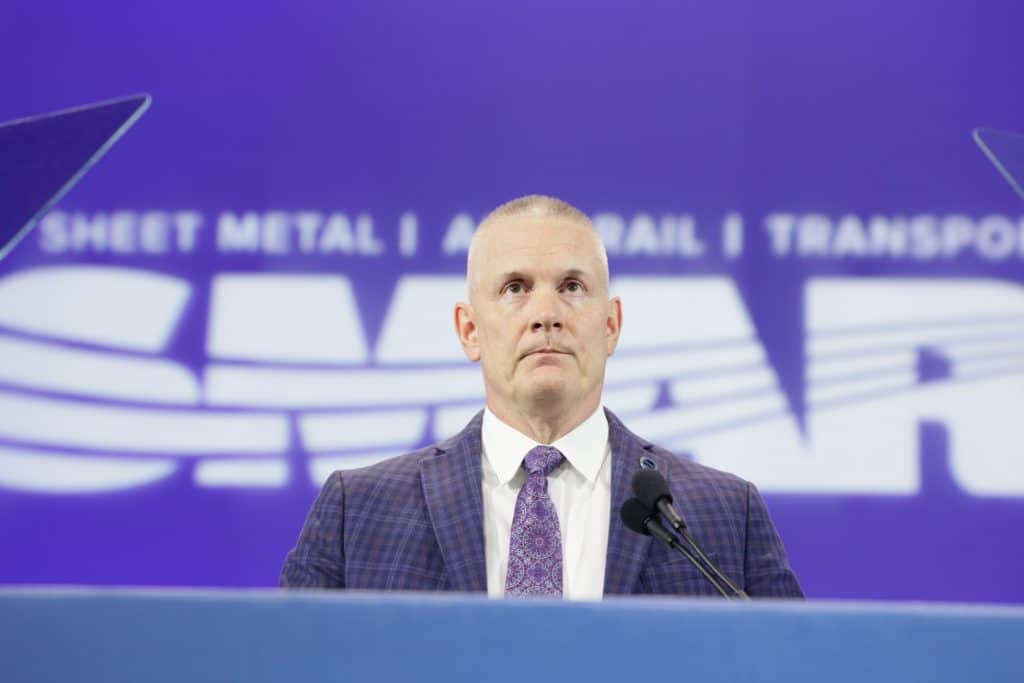
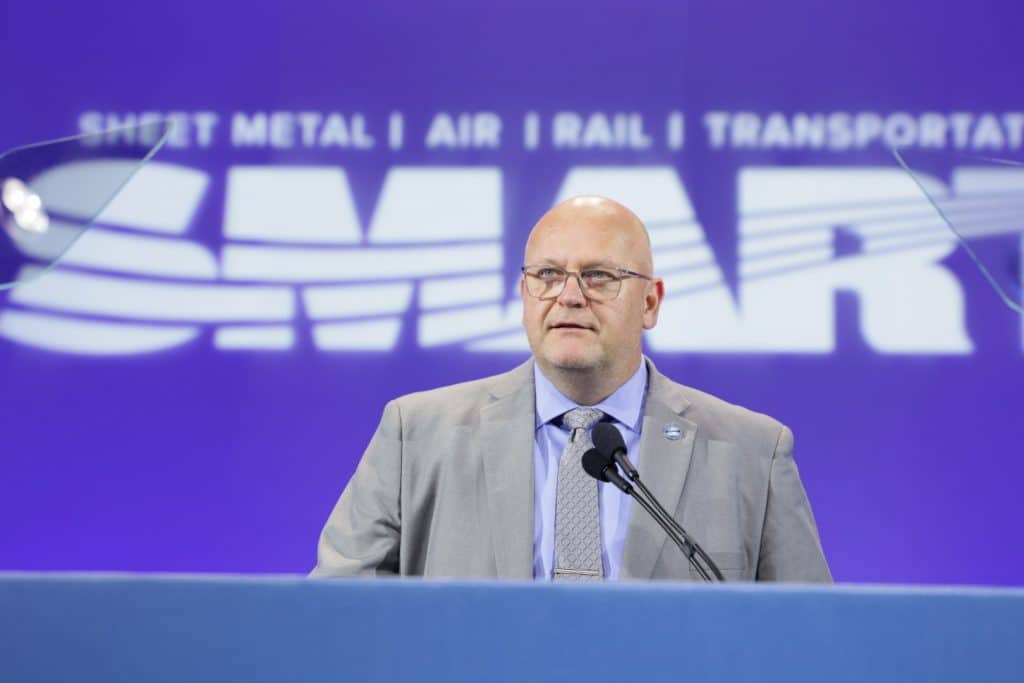
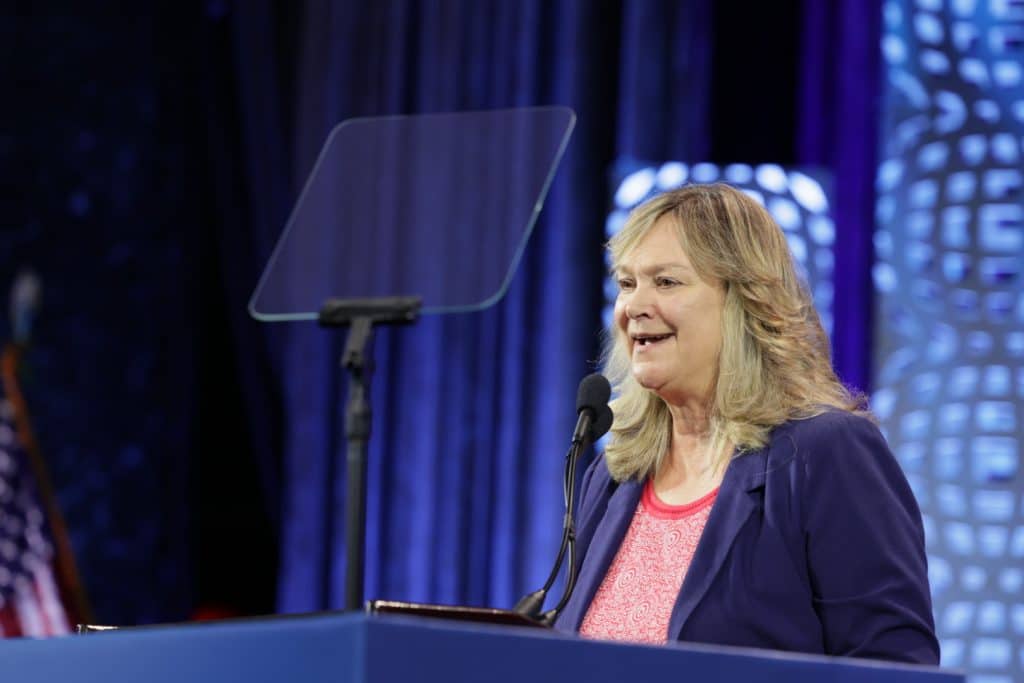
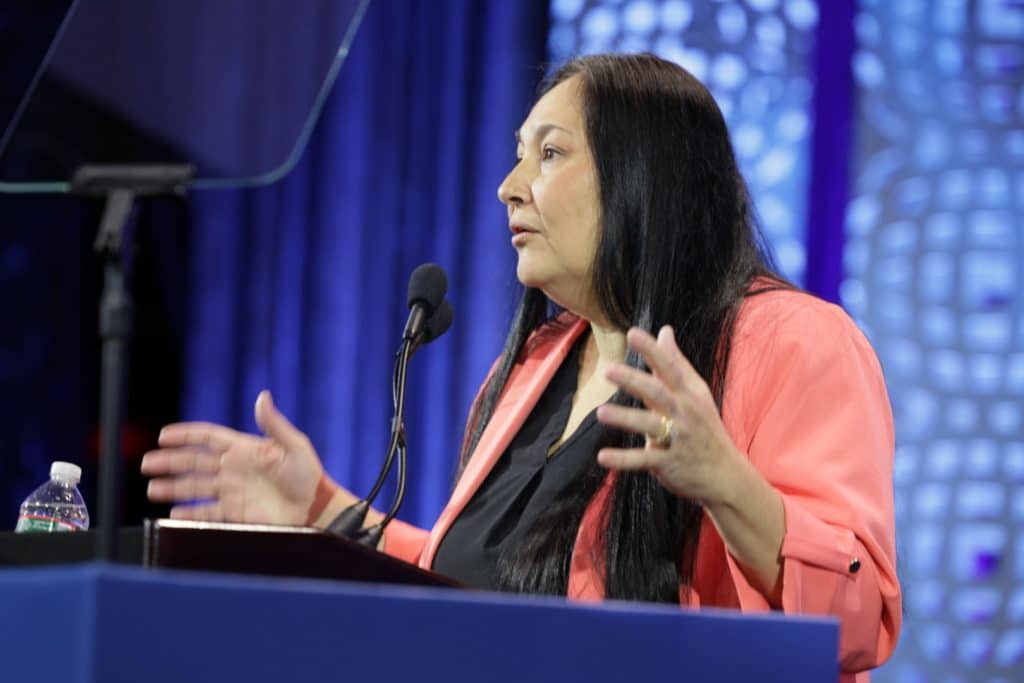
Legislative and governmental challenges at the federal level present troubling challenges to local officers and SMART members in the United States, while in Canada, pro-worker policymaking looks set to place large workforce demands on locals from coast to coast to coast. In both situations, SMART locals have one tried-and-true practice to pursue: organize. SMART Director of Organizing Jason Benson broke down the organizing our union has conducted both over the last five years and in the first quarter of 2025, detailing how International staff members work to support locals.
“To wrap up, my message is simple but powerful,” he said. “We’ve got to organize, organize, organize. Whether it’s through boots on the ground, informed data or blitzes, we are building a smarter, stronger, more resilient union, so let’s keep that progress going together.”
The SMART Production Department works to support production and mixed-classification local unions across North America: advocating for production workers, helping organize more shops, assisting during bargaining and beyond. Director of Production Workers Dave Goodspeed reported on the department’s efforts in all those areas, including the recent formation of the Central States Production Council and the ongoing success of the Production Institute, plus detailed the wins various subsidized production organizers have achieved.
“In 2025, we will see the first graduating class of the Production Institute,” he noted. “Through this program, our greatest hope is that we are developing leaders to grow our production units across the industry and into the next generation.”
The promise of a union pension is one of the most important aspects of SMART membership. Sheet Metal Workers’ National Pension Fund Executive Director Lori Wood provided an in-depth report on the NPF’s finances, projections and the work performed by NPF staff to ensure its past, present and future livelihood. Our union’s pension plans are well-funded and financially stable, reflecting our commitment to ensuring long-term security for our members’ retirement.
Read a recap that includes SMART-TD’s transportation-specific session here.
Whether in the breakout sessions that put officers to work or in the remarks of congressional allies that actually act on behalf of SMART workers, day two of the 2025 SMART Leadership Conferenced demonstrated what fighting for members actually looks like. Union representation extends from the workplace, to the union hall, to Washington, DC, and Ottawa — in any arena where members’ interests can be fought for, SMART will fight for what matters.
Related News
- Senate Hearing Highlights the Good, the Bad, and The Ugly of RRB
- On-Duty Assault Leaves Amtrak Conductor Facing Financial Hardship
- Transit Equity Day: Remembering Rosa Parks
- Railroads Have Short Memories: East Palestine 3 Years Later
- SMART Local 1 signs new contractor to complete specialized workforce request
- RIDER Safety ACT Aims to Curb Transit Assaults Nationwide
- Rail Safety Is Too Important For Corporate Discretion
- Virginia 2-PC Law Could Become a Reality if We Act Now
- WATCH: Members Step Up to Take Care of Their Own
- Fighting for prevailing wage in the shop: Massachusetts union leader explains the offsite fabrication loophole